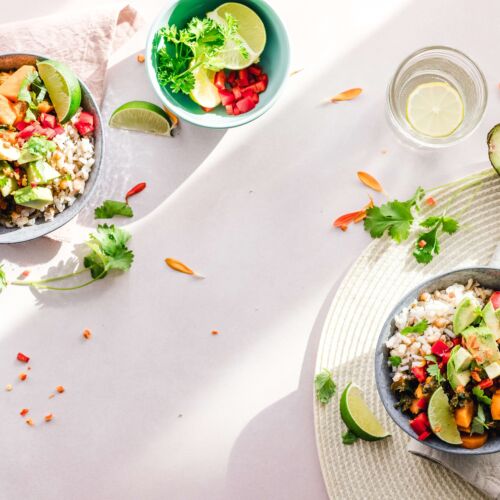5 Tips on How to Ditch the Diet Mentality
by Dawid Furman

Ditching the Diet Mentality is the first principle of Intuitive Eating outlined by Tribole & Resch in the Intuitive Eating Workbook.
So, you’re ready to ditch the diet mentality, but it feels like you’re at your first swimming class, and you’re hugging the wall in the shallow end? If you’re nodding your head yes, then keep reading to learn where to start.
It can be quite vulnerable to give up the diet mentality, but what are you really giving up? If we get objective and look at the scientific evidence, you’ll realise that dieting is a party you did not really want to be at anyway.
Studies show:
- In the long run, diets don’t really work.
- Diets may make you put on weight due to a series of metabolic factors.
- Dieting is also dangerous for your psychological health and well-being and increases the risks of eating disorders as well as binge eating.
Intuitive eating is eating based on cues sent by the body. The problem is most people don’t know how to listen to what their body needs thanks to the strong diet culture.
Here are 5 tips on how to ditch the diet mentality once and for all.
1. Cultivate Self Compassion
Treating both positive and negative eating experiences as a learning curve rather than beating yourself up can help overcome guilt and promote change.
Cultivating self-compassion will result in better well-being, increased feelings of happiness as well as a greater personal initiative to make a change.
To cultivate self-compassion, compare how you respond to yourself and how you would respond to a friend that is struggling with eating and compare the difference in response. Now think how things would be different if you responded more kindly to yourself.
2. Assess Your Diet History
Did you ever go on a diet and lose a lot of weight just to end up putting it back on in the long run?
Reflect on past diets you went on and ask yourself objectively did they actually work in the long run after initial weight loss.
Often people think a diet worked because of initial weight loss; however, studies indicate that in most cases, the weight comes back gradually.
By assessing your diet history, you can start to notice that diets have not had the results promised or delivered on the way they were going to make you feel.
It is not unusual to feel sad to have to give up this hope, and for some, it may feel like a loss.
3. Ask Yourself How Dieting Has Interfered With Your Life and How You Would Benefit From Letting Dieting Go
Dieting not only can put a burden on your wallet but also harms your behavioural and mental health, physical health, as well as your social life and relationships.
Ask yourself how dieting has affected your eating behaviour, what physical consequences you experienced from dieting as well as how much money and time you spent chasing weight loss.
Would the answers to the above questions make you consider quitting the diet mentality forever?
Continuously going on diet after diet makes your weight fluctuate, which is proven by research to have a negative effect on physical and mental health.
4. Identify and Let Go of Different Traits and Thoughts Related to Dieting
Holding on to different thoughts and beliefs related to weight loss can make it difficult to forget about dieting, even when you know it’s not the answer considering you may be stuck in the vision of achieving a “different version of yourself”.
Ask yourself what your beliefs are in regard to your weight loss and where these beliefs come from, as well as how do you see your life changing if you lost weight.
Next, ask yourself, have these beliefs ever put parts of your life on hold as you wanted to wait till you lost weight to do them?
Based on your answers, reflect how you could pursue those things here and now in your current body instead of waiting until you lose weight, as holding on to these fantasies can keep you stuck in the diet mentality.
5. Get Rid Dieting Tools
Tools such as weighing and measuring scales, as well as calorie counting, are considered external tools of dieting
Review which dieting tools you may still be using from the list below:
| 1 | I count my calories and try do not exceed a certain amount |
| 2 | I will not eat a certain meal/snack if I exceed a certain amount of calories |
| 3 | I choose low calorie foods at restaurants and wont eat something without knowing its calories |
| 4 | I often weigh myself |
| 5 | I exercise to burn calories |
| 6 | I avoid certain foods such as ones that contain carbohydrates, sugar and fat |
| 7 | I weigh my food to make sure I am not over consuming calories |
| 8 | I exercise if I eat to much |
| 9 | I google articles, read blogs and save books on dieting and how to loose weight |
| 10 | I collect low calorie recipes that supposedly help lose weight |
| 11 | I take supplements, that supposedly burn fat and help lose weight |
From the list of dieting tools you may have been using, decide how you could work on each action to move toward more intuitive eating, such as not weighing yourself, putting more emphasis on how you feel, or adding foods you enjoy instead of eliminating foods.
Retraining your brain to ditch the diet mentality is really hard work and it may take some support from a Dietitian or counselor in order to implement. The benefit is changing your relationship with food and releasing unrealistic expectations based on the diet industry.
If you are interested to learn more about Intuitive Eating, check out these resources.
- Ditch The Diet Mentality
- Honor Your Hunger
- Make Peace With Food
- Challenge The Food Police
- Feel Your Fullness
- Discover The Satisfaction Factor
- Cope with Your Feelings Without Using Food
- Respect Your Body
- Exercise: Feel the Difference
- Honour Your Health: Feel the Difference
Find a Registered Dietitian that can help here.
On Dietitian Directory, you can find all sorts of Dietitians, including Intuitive Eating Dietitians, Weight Inclusive Dietitians, Mindful Eating Dietitians, and Emotional Eating Dietitians



